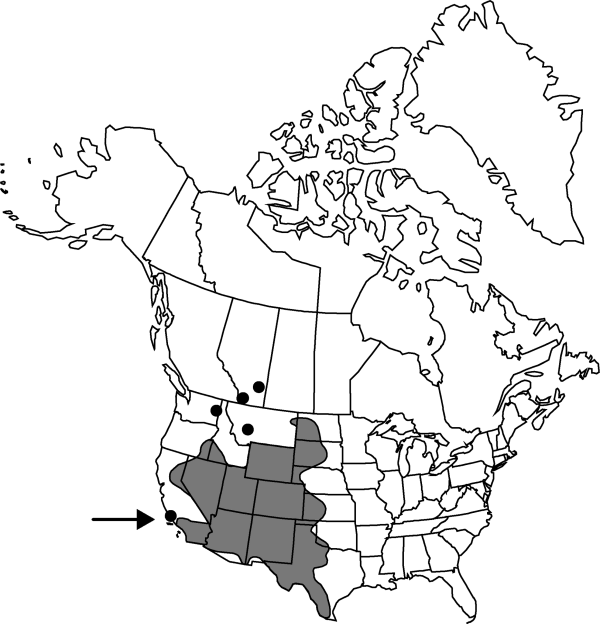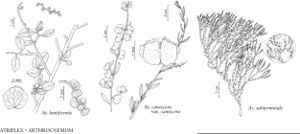Difference between revisions of "Atriplex canescens var. canescens"
FNA>Volume Importer |
FNA>Volume Importer |
||
| Line 7: | Line 7: | ||
|name=Atriplex canescens var. angustifolia | |name=Atriplex canescens var. angustifolia | ||
|authority=(Torrey & Frémont) S. L. Welsh & Stutz | |authority=(Torrey & Frémont) S. L. Welsh & Stutz | ||
| − | }}{{Treatment/ID/Synonym | + | }} {{Treatment/ID/Synonym |
|name=Atriplex canescens var. occidentalis | |name=Atriplex canescens var. occidentalis | ||
|authority=unknown | |authority=unknown | ||
| Line 25: | Line 25: | ||
|elevation=100-2400 m | |elevation=100-2400 m | ||
|distribution=Alta.;Ariz.;Calif.;Colo.;Idaho;Kans.;Mont.;Nebr.;Nev.;N.Mex.;N.Dak.;Okla.;Oreg.;S.Dak.;Tex.;Utah;Wash.;Wyo.;Mexico. | |distribution=Alta.;Ariz.;Calif.;Colo.;Idaho;Kans.;Mont.;Nebr.;Nev.;N.Mex.;N.Dak.;Okla.;Oreg.;S.Dak.;Tex.;Utah;Wash.;Wyo.;Mexico. | ||
| − | |discussion=<p>Narrow-leaved material from west Texas formed the basis of Atriplex canescens var. angustifolia. The nature of such narrow-leaved phases requires additional research. Probably the Texas plants having narrow leaves originated quite separately of other narrow-leaved phases.</p> | + | |discussion=<p>Narrow-leaved material from west Texas formed the basis of <i>Atriplex canescens</i> <i></i>var.<i> angustifolia</i>. The nature of such narrow-leaved phases requires additional research. Probably the Texas plants having narrow leaves originated quite separately of other narrow-leaved phases.</p> |
|tables= | |tables= | ||
|references= | |references= | ||
| Line 49: | Line 49: | ||
|publication year= | |publication year= | ||
|special status= | |special status= | ||
| − | |source xml=https://jpend@bitbucket.org/aafc-mbb/fna-data-curation.git/src/ | + | |source xml=https://jpend@bitbucket.org/aafc-mbb/fna-data-curation.git/src/8f726806613d60c220dc4493de13607dd3150896/coarse_grained_fna_xml/V4/V4_753.xml |
|genus=Atriplex | |genus=Atriplex | ||
|subgenus=Atriplex subg. Pterochiton | |subgenus=Atriplex subg. Pterochiton | ||
Revision as of 17:30, 18 September 2019
Plants mainly 8–20 dm, not especially armed, not or seldom layering. Pistillate flowers borne in panicles 5–40 cm. Fruiting bracteoles with stipes 1–8, body with 4 prominent, dentate to entire wings extending length of bract, united throughout, mainly 8–12 mm wide and about as long, apex toothed, surface of wings and body smooth or reticulate. 2n = 36+.
Phenology: Flowering spring–fall.
Habitat: Sandy or gravelly, commonly non-saline but in other situations obviously saline, sites in Joshua tree, blackbrush, greasewood, salt desert shrub, sagebrush, mountain brush, and pinyon-juniper communities
Elevation: 100-2400 m
Distribution

Alta., Ariz., Calif., Colo., Idaho, Kans., Mont., Nebr., Nev., N.Mex., N.Dak., Okla., Oreg., S.Dak., Tex., Utah, Wash., Wyo., Mexico.
Discussion
Narrow-leaved material from west Texas formed the basis of Atriplex canescens var. angustifolia. The nature of such narrow-leaved phases requires additional research. Probably the Texas plants having narrow leaves originated quite separately of other narrow-leaved phases.
Selected References
None.
